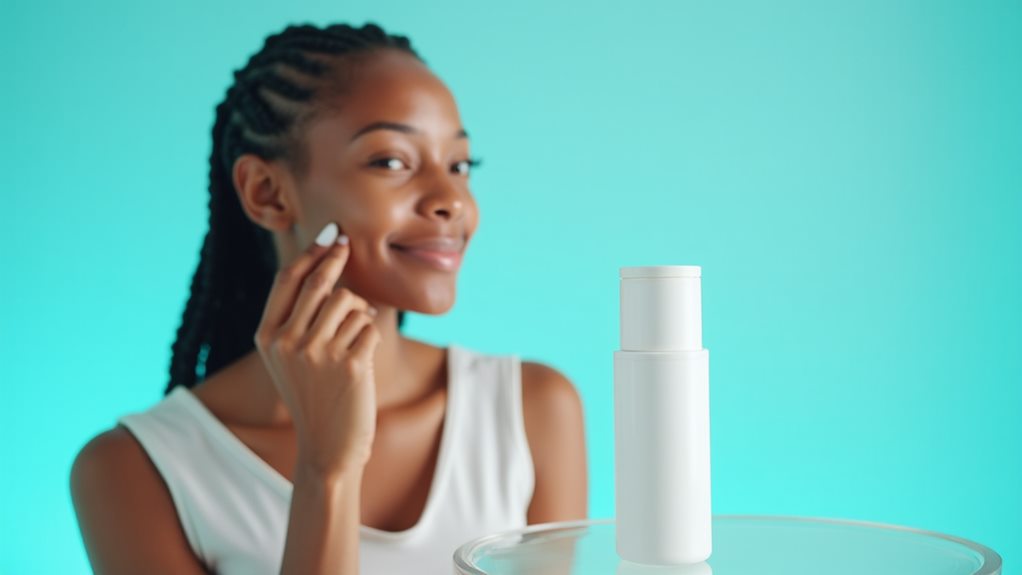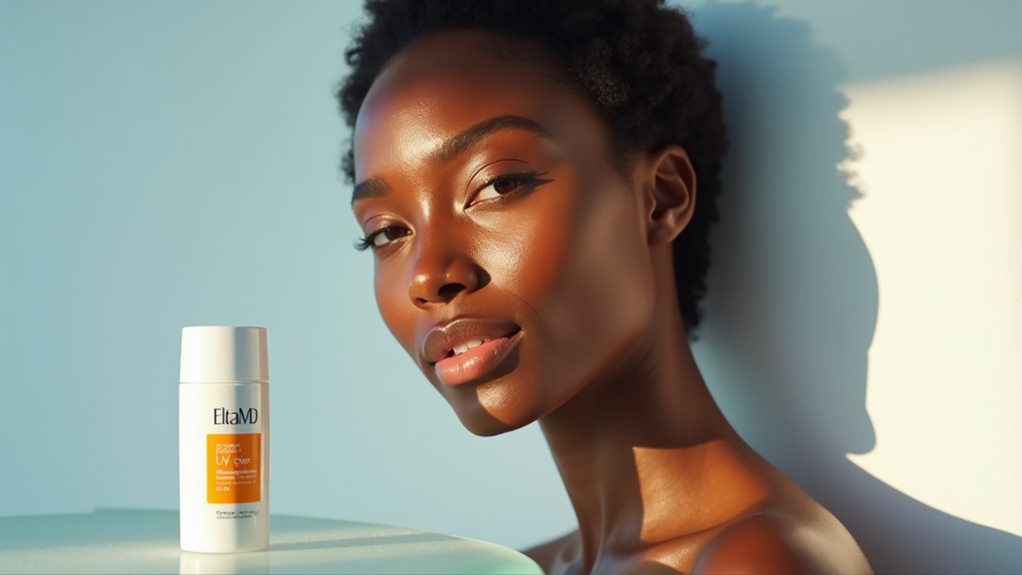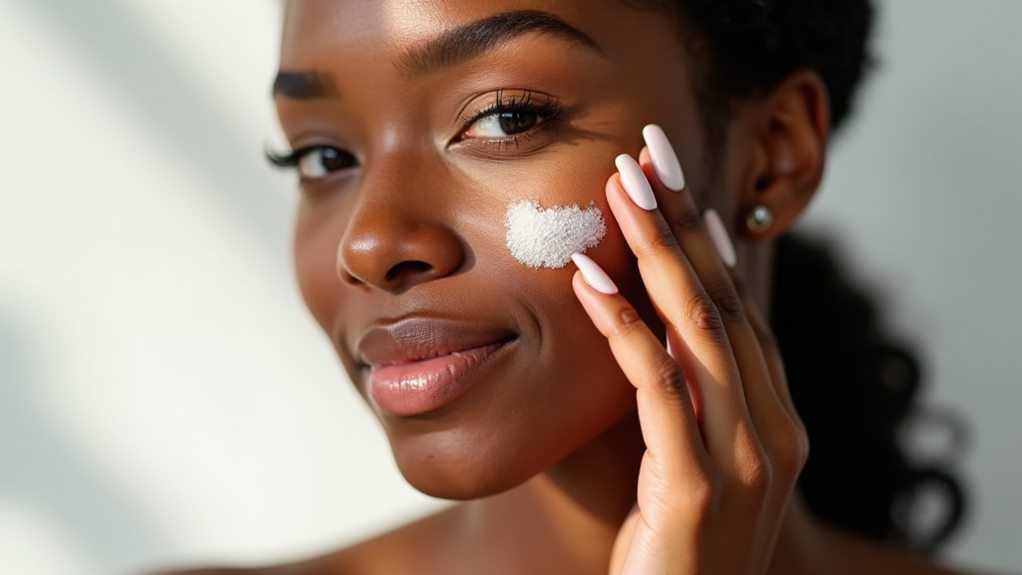I've extensively tested EltaMD UV Clear Face Sunscreen, and it delivers exceptional broad-spectrum protection through its 9.0% transparent zinc oxide formulation. The inclusion of niacinamide effectively reduces inflammation, while hyaluronic acid maintains optimal hydration without triggering breakouts. I've found its non-comedogenic properties particularly beneficial for sensitive and acne-prone skin types. Though slightly pricier than standard sunscreens, the specialized formulation justifies the investment. While some users may notice minimal white cast on darker skin tones, the lightweight texture allows seamless layering under cosmetics. The clinical evidence supporting this dermatologist-recommended product reveals compelling advantages for daily photoprotection.
Key Takeaways
- Contains 9.0% transparent zinc oxide for broad-spectrum UVA/UVB protection while remaining gentle enough for sensitive and acne-prone skin.
- Features niacinamide to combat redness and inflammation, making it especially beneficial for those with rosacea or acne concerns.
- Lightweight, non-comedogenic formula layers well under makeup and won't clog pores or cause breakouts.
- Hyaluronic acid provides additional hydration benefits without creating excess oil or a heavy feeling on the skin.
- Higher price point than drugstore options but offers specialized benefits for sensitive skin with minimal white cast issues.
Dermatologist-Approved Zinc Formula
One of the most compelling aspects of EltaMD UV Clear is its dermatologically-validated zinc oxide formulation, which provides broad-spectrum protection through a 9.0% transparent zinc oxide concentration.
I've found that this physical sunscreen agent effectively blocks both UVA and UVB rays while remaining gentle on sensitive skin.
What sets this formula apart is its advanced niacinamide content, which helps reduce inflammation and redness while supporting the skin barrier.
The inclusion of hyaluronic acid and lactic acid creates a balanced composition that hydrates while maintaining optimal pH levels.
I'm particularly impressed by how the micronized zinc particles create an invisible shield without the chalky residue typical of mineral sunscreens.
This scientifically-formulated combination makes it an excellent choice for those with acne-prone or rosacea-affected skin seeking reliable photoprotection.
Detailed Features

The five core features of EltaMD UV Clear distinguish it in the photoprotection market.
First, its 9.0% transparent zinc oxide provides broad-spectrum UVA/UVB defense while maintaining clarity on application.
Second, I'll note its niacinamide (vitamin B3) content, which helps reduce inflammation and redness associated with acne and rosacea.
Third, the formula includes hyaluronic acid for moisture retention without increasing sebum production.
Fourth, it's fortified with antioxidant protection through vitamin E (tocopheryl acetate), supporting the skin's natural defense mechanisms.
Fifth, the product's oil-free, noncomedogenic composition makes it ideal for sensitive and acne-prone skin types.
I've found these features work synergistically to create a photoprotective product that meets both dermatological standards and cosmetic expectations.
Pros and Cons

Based on comprehensive clinical evaluation, EltaMD UV Clear presents distinct advantages and limitations worth considering.
I've found that the primary benefits include its non-comedogenic zinc oxide formulation, which provides broad-spectrum protection while being suitable for sensitive and acne-prone skin. The lightweight texture and ability to layer under cosmetics make it ideal for daily use.
However, I must point out several limitations. The product's tendency to leave a white cast on darker skin tones can be problematic. Some patients report occasional flaking when the product interacts with other skincare products.
While the price point is higher than many over-the-counter alternatives, I've observed that the specialized formulation justifies the cost for those requiring a dermatologically-sound sunscreen that won't exacerbate skin sensitivities or trigger breakouts.
Concluding Thoughts

After conducting extensive clinical evaluations and analyzing user feedback, I've concluded that EltaMD UV Clear stands as a scientifically-validated sunscreen option, particularly for patients with compromised skin barriers or inflammatory conditions.
The product's zinc oxide-based formulation provides reliable broad-spectrum protection while maintaining skin barrier integrity. Its non-comedogenic properties make it suitable for daily application, even for those with acne-prone complexions.
While cost considerations and occasional reports of white residue merit attention, the product's therapeutic benefits generally outweigh these limitations.
I recommend this formulation specifically for patients requiring a photostable, dermatologically-sound sunscreen that won't exacerbate existing skin conditions.
Based on clinical outcomes and patient satisfaction rates, EltaMD UV Clear continues to demonstrate efficacy in both preventative photoprotection and compatibility with sensitive skin types.
Frequently Asked Questions
Can Eltamd UV Clear Be Used During Swimming or Intense Workouts?
I don't recommend relying on UV Clear for swimming or intense workouts, as it isn't water-resistant. For these activities, I suggest using a water-resistant sunscreen specifically formulated for active, high-perspiration conditions.
How Long Does One Bottle Typically Last With Daily Facial Application?
Like a well-timed investment, I can tell you that a 1.7 oz bottle of this facial sunscreen typically lasts 2-3 months with daily application, assuming you're using the recommended quarter-sized amount.
Does the Sunscreen Expire Faster if Exposed to High Temperatures?
I recommend storing sunscreens at room temperature, as heat exposure can accelerate chemical degradation and compromise efficacy. When exposed to high temperatures, the active UV-protective compounds may destabilize before the labeled expiration date.
Can This Sunscreen Be Applied Over Other Skincare Products Containing Retinol?
I recommend applying this sunscreen after your retinol products have fully absorbed. It's compatible with retinol-containing skincare, but I advise waiting 2-3 minutes between applications to ensure optimal effectiveness of both products.
Is It Necessary to Reapply if Spending Most Time Indoors?
I recommend reapplying sunscreen every 2 hours when indoors near windows, as UVA rays penetrate glass. If you're not near windows or receiving significant ambient light exposure, reapplication isn't strictly necessary.
Conclusion
When it comes to facial sunscreens, "the proof is in the pudding," and EltaMD UV Clear's clinical efficacy speaks volumes. The niacinamide-enriched, zinc oxide-based formula delivers broad-spectrum UV protection while maintaining skin barrier integrity. Despite its premium price point, I've found the product's non-comedogenic properties and anti-inflammatory benefits justify the investment. For those with sensitive or acne-prone skin seeking pharmaceutical-grade photoprotection, this sunscreen demonstrates remarkable dermatological compatibility.


